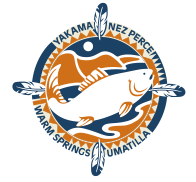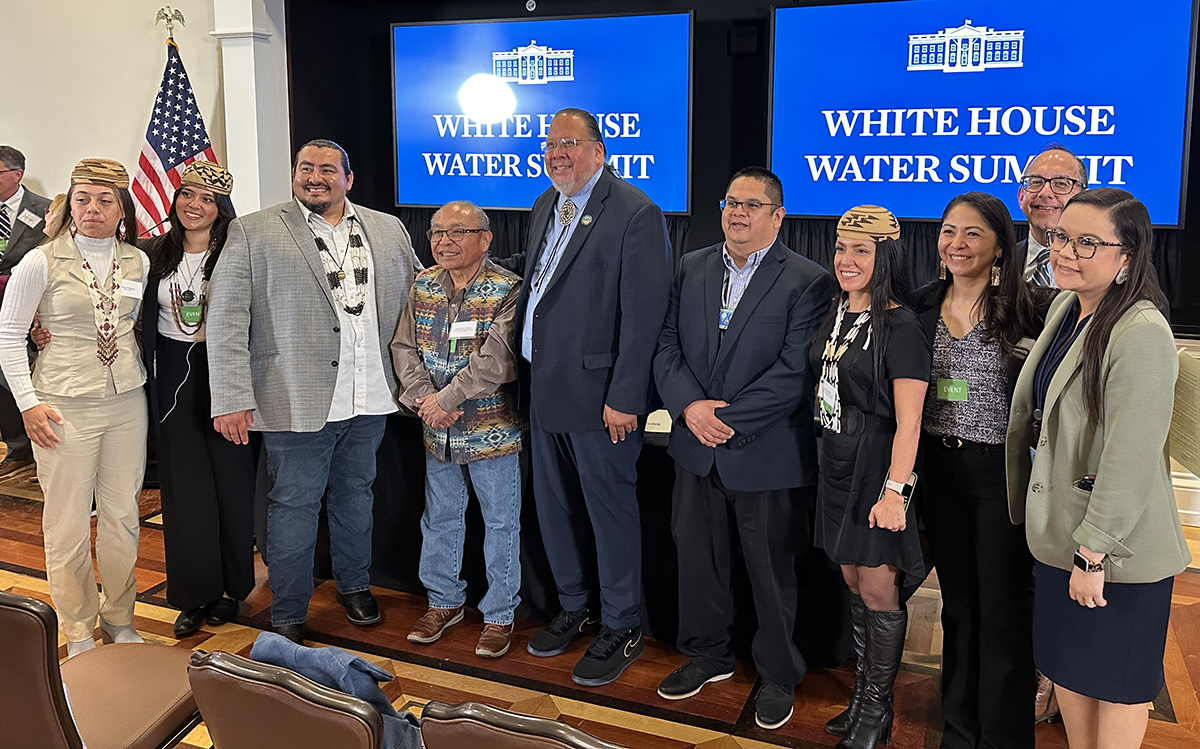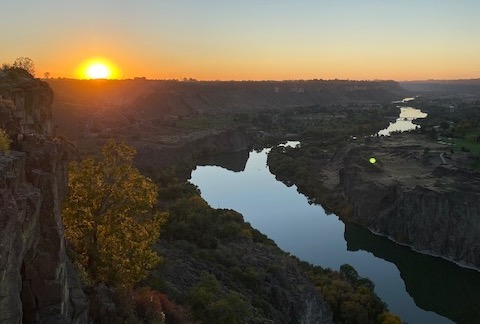by Andrea Tulee, CRITFC Communications
CRITFC is excited to announce Faron Scissons as our Deputy Manager of our new Community Development Department. Faron has been a critical part of the CRITFC team and we’re excited to bring her experience and expertise into this new role.
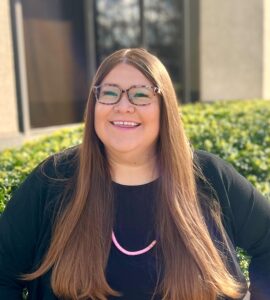
Faron Scissons, deputy manager of CRITFC’s new Community Development Department.
Q: Thanks for talking with me Faron and congratulations on your new position. Can you introduce yourself tell us a little about your background?
I appreciate the opportunity to chat with you about this exciting new department, I’m excited to support the tribes in this capacity. My name is Faron Scissons, and I grew up here in the Portland area. I am enrolled Rosebud Sioux, but also a White Earth Minnesota Chippewa and Sisseton Wahpeton descendent. I started working at CRITFC in 2010 as an on-call receptionist. I was eventually hired at CRITFC in an on-call capacity filling in for administrative assistants in the Fishery Science and Fish Management departments all while going to school for my associate’s degree. I then became the administrative assistant for the Policy Department while getting my bachelor’s degree, later getting promoted to Legal Assitant II. During the pandemic as CRITFC added more direct services to fishers along the Columbia River, my role was expanded to include being CRITFC’s Public Health Specialist. So, I’ve been with CRITFC for quite some time and have been lucky enough to experience the different departments and their efforts for the Commission as well.
Q: This isn’t just a new position for you, it’s a whole new department for CRITFC—the Community Development Department. Can you give a little background on why this new department was created and what it will be doing?
Absolutely, this is a big change not only for CRITFC, but also for the tribal members that we serve. Throughout the pandemic, we have built some amazing relationships with the State of Oregon, the USDA, and the First Nations Development Institute and have been able to provide support for the community needs outside of CRITFC’s historic reach. This department is basically the portion of CRITFC’s direct services to tribal members living and fishing in Zone 6 of the Columbia River. This department will house our community outreach team, our new food sovereignty efforts through our tribal food program, which I’m real excited for, and lastly, our salmon marketing program is moving over as well.
This department will have a wide range of responsibilities for each program, from the development of cultural and nutritional food programs to marketing initiatives and outreach efforts to promote tribal fishers’ well-being and safety while they actively participate in exercising their treaty fishing rights.
Q: The tribes have given CRITFC guidance to help support tribal fishers living permanently or temporarily along the Columbia River as they exercise their treaty-reserved fishing rights including maintaining the fishing access sites and helping develop commercial salmon markets. But during the pandemic, this community was especially impacted by the pandemic. What was that like? What role did CRITFC play to help address these needs?
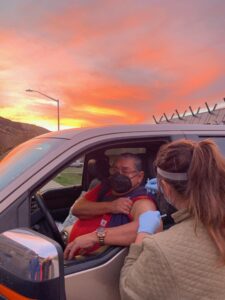
Klickitat River Chief Wilbur Slockish getting his COVID vaccination at a Celilo Village vaccination event.
The pandemic was such a hard time, not only for all of us, but I think it was especially hard for those at the fishing access sites. When we first got involved, we were scrambling just to find food and masks for tribal members. Thankfully, we had a lot of great leadership and support from the Commissioners to just run with providing support to these sites. We started meeting with community partners and finding different service providers for various needs all while applying for different grants and opportunities to continue to fund this effort.
We were able to host on-site COVID testing events prior to the start of the fishing season available to all fishers. Through a wonderful relationship with One Community Health and the Oregon Health Authority, we were the first in the Gorge to provide COVID vaccines to tribal members in the region and able to provide them based off our definition of who was eligible.
We held our first vaccination event at Celilo Village and it was such a huge success. We had some amazing community partners support this effort and was even able to provide transportation to those who needed it. We had elders from the entire length of the 147-mile stretch of Zone 6 attend this event from Ft. Raines to Boardman attend this event. To see such a wide participation was so rewarding.
So, while the pandemic was a scary time and we lost a lot of people, it was also a rewarding time, and we were able to provide valuable support to a lot of individuals.
Q: Did this new work lay the groundwork to create the new Community Development Department?
Totally. Through these partnerships and all the work our team has been doing for the past four years now, we have been able to highlight the needs to our funders and they supported our effort to create this department. I’m proud to see how far this team has come with all our efforts, but I am excited to see how this department will grow over the next year, five, and even ten years.
Q: CRITFC has been supporting tribal fishers living permanently or temporarily along the Columbia River as they exercise their treaty-reserved fishing rights for years, but the pandemic showed a much bigger need. Can you talk a bit about what that need is and how CRITFC, the member tribes, and other organizations came together to address it?
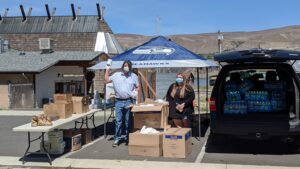
Faron and Buck Jones, CRITFC’s salmon marketing specialist, at a supply distribution in Celilo Village in 2021.
I think it was more of the aftermath of the pandemic that really showed the much bigger need. During the pandemic, the states were throwing funds at us to assist with providing water, food, housing resources during isolation, health care access, and other resources, but it was after the emergency funding ended that the bigger need became apparent to me.
It was easy in the moment to band-aid the issues, but I think the main need is truly decent low-income housing options and the need to advocate for requirement changes for those who do try to seek federal, state, local, and event private assistance. It’s tough for those exercising their treaty rights, especially the fishers, when they’re asked for paycheck stubs or fixed addresses to access resources, which as we know is not available information for those either at the fishing access sites or even those not on sites who exercise their rights to fish. Even when signing up for COVID testing or events, some individuals had difficulty because of the information that was required.
I think to address the issues, a lot of advocacy and education for these partners is key to work together to fix the issue. I was recently invited to join the Oregon Health Authority Health Equity Framework work group, and that is what I’m personally hoping to accomplish with being a part of this group. I’m hoping to advocate and educate these policymakers that tribal members along the river who don’t have immediate access to their local IHS clinic have a difficult time accessing care.
Q: You graduated with a master’s degree in Federal Indian Law last fall. Congratulations! How was it balancing your full-time work with your schooling? Any advice you could give students who might be in that same situation?
Thank you so much. It was such a rewarding experience. I think like when you get into any extracurricular activity outside of your normal demanding work schedule, it can be exciting but also challenging at times. Balancing full-time work and full-time schoolwork requires significant time commitments, a lot of effort, and so many social sacrifices, but I would tell anyone in the same situation it is SO worth it in the long run.
When I first enrolled in my program, I let my manager know and then my key coworkers that I have an active supportive role with and was just completely transparent with them. Communicating important dates, like mid-term and finals weeks, was key to prioritize tasks both with my manager and professors. Lastly, I would tell people to not to be afraid to reach out to either your professors, coworkers, or managers to seek support as needed and to remember that you’re not alone going through this.
Q: I’ve really enjoyed working with you on various projects and I’ve noticed what a great collaborator you are in terms of project and event planning. Can you tell us about one of your favorite projects you’ve worked on while working at CRITFC?
Thank you. I really enjoy the team efforts we have for planning these events. Out of all the different events, I think the Tribal Fishers Expo is always a big highlight for me. It’s such an important event for our fishers and any time that we can promote boating, fishing, or general river safety is always a high priority for me. I love the interaction with the fishers and finding new and cool things that we can share with them. I’m real excited in how the direction our Expos have been going, but also the Salmon Marketing program as well. With social media so prevalent and the ability to get a wide variety of information out to the masses, I’m really hoping to bring salmon marketing into the digital world and really highlight and support that with our fishers as well. There are a lot of great tools and strategies out there that is newer in marketing, so bringing that technology and resources to our fishers through the Expo is a goal for me.
Q: What is your favorite part and/or a fond memory you have of working with tribal communities along the river?
That is a good question! It is so hard to pick just one fond memory or a favorite part. You know I’ve been here 13 ½ years and participated in so many amazing events and projects; worked with a lot of amazing Commissioners, tribal leaders, and so many different community members, one memory would be hard to pinpoint. I will say that all the relationships built throughout the duration of my time here has been my favorite part. Seeing the new generation of young fishers actively engaging in our events or joining family members at the fishing sites during the season has been exciting for me. It’s so crazy to remember their mom or dad at their similar age actively being involved alongside their own parents or grandparents. It’s a remarkable and gratifying experience to see the generations continuing and connecting.
Q: The last question I have for you is would you share something significant you’ve learned about the Columbia River tribal communities that you would like others to know about as well?
One valuable thing I’ve learned is the remarkable strength of the community bond among those living along the river. At specific sites where there are elderly individuals, the sense of collective care is striking. During our outreach efforts, everyone at these locations goes the extra mile to ensure the well-being of the elderly residents. Some even decline assistance for themselves, opting instead to allocate extra support to the elderly members of the community. It’s really touching to see. I think often people only hear the negative sides or concerns about life along the river, but there is this really great sense of community out there and it’s a beautiful thing to witness.
